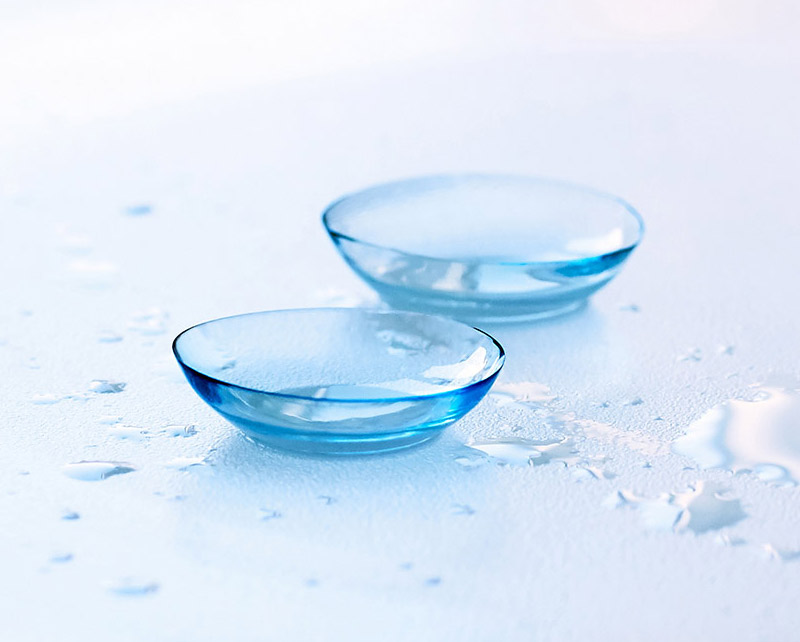Contact Lenses
Contact Lenses in Austin, Texas
Looking for contact lenses in Austin, TX? At Northwest Hills Eye Care, we provide contact lens exams in Austin and a variety of contact lenses to suit most people, including those who have been classified as “hard to fit” in contact lenses due to corneal irregularities, dry eye disease, astigmatism, and more.
Contact lenses are a popular option for vision correction and for good reasons! Since they sit directly on the cornea, they allow for a wider field of view than eyeglasses. They provide a more natural look than eyeglasses, allowing you to present your face to the world without the obstruction of eyeglass frames. They provide effective, sharp vision correction for nearsightedness, farsightedness, astigmatism, and presbyopia. They won’t fog up in humid or rainy weather, and when engaged in physical activity, you can enjoy great vision without worrying about your eyeglasses getting damaged.
Types of contact lenses
There are different types of contact lenses to accommodate a wide range of visual needs, and different wear schedules. Your eye doctor will prescribe the type of contact lens and wear schedule based on your visual needs and lifestyle. It is important to follow your eye doctor’s instructions, as improper use of contact lenses can lead to serious eye problems, including painful infections and even vision loss.
Soft contact lenses
These are the most common type of contact lenses and the most frequently prescribed. They are made of a flexible plastic material that conforms to the shape of your eye.
Rigid gas permeable (RGP) contact lenses
These are made of a firm plastic material that allows oxygen to pass through to the eye. RGP lenses are more durable than soft contact lenses and provide sharp vision. They are suitable for people with astigmatism, corneal irregularities, and those who need bifocal lenses.
Toric contact lenses
These contact lenses are designed to correct astigmatism and are available in both soft and RGP varieties.
Multifocal contact lenses
Multifocal contact lenses are especially popular in people ages 40 and over who prefer contacts to glasses. This is because many people in this age group have presbyopia, a condition in which the eyes gradually lose their ability to focus on nearby objects. Those with presbyopia often find themselves putting on reading glasses over their contact lenses to read menus or other close-up material.
Multifocal contact lenses offer good near and far-away vision. Some multifocal contact lenses have a bifocal design with two distinct power levels, one for close-up work and another for seeing faraway objects. Others have several power levels, much like progressive eyeglass lenses, that offer a gradual transition from far away to close up.
Scleral contact lenses
Scleral lenses are a type of contact lens that is larger in diameter than traditional contact lenses. They are designed to vault over the cornea and rest on the sclera, the white part of the eye. This creates a space between the back surface of the lens and the cornea, which is filled with tears. Scleral lenses are made of a highly breathable material, which allows oxygen to pass through to the eye.
Benefits of Scleral Lenses
- Scleral lenses can provide better vision than traditional contact lenses or glasses. Because they sit on the sclera rather than the cornea, they can correct for irregularities in the cornea, such as those caused by keratoconus, which can lead to distorted or blurry vision.
- Scleral lenses are very comfortable to wear because they don’t contact the sensitive cornea. The space between the lens and the cornea is filled with tears, which helps to keep the eye lubricated throughout the day.
- Because scleral lenses vault over the cornea and rest on the sclera, they can protect the cornea from environmental irritants such as wind or dust.
- Scleral lenses can be worn longer than traditional contact lenses, making them ideal for people who need to wear their lenses for extended periods.
Prosthetic contact lenses
Prosthetic contact lenses, also known as cosmetic or tinted contact lenses, are lenses that are designed to change the appearance of the eye. They are used to improve the cosmetic appearance of eyes that are disfigured or discolored due to injury, disease, or genetic conditions.
Prosthetic contact lenses are typically custom-made to match the color and shape of the patient’s natural eye. They can be used to cover a discolored or scarred cornea, to create a more uniform color, or to mask an iris defect. These lenses are typically tinted and can be either semi-opaque or fully opaque, depending on the needs of the patient. They can also be used for theatrical or costume purposes.
Prosthetic contact lenses are considered a medical device and require a prescription from a licensed eye care professional. It’s important to note that these lenses should only be obtained from a licensed eye care professional and that proper care and maintenance are essential to prevent infection and other complications.
Schedule a contact lens exam
If you need contact lenses in Austin, TX, the first step is to schedule a contact lens exam and fitting. The eye doctors at Northwest Hills Eye Care are highly skilled at fitting people in contact lenses, even those who have been told they are “hard to fit” in contact lenses. Contact us today to schedule your contact lens exam!

Order Contact Lenses
Refill your contact lens prescription online




